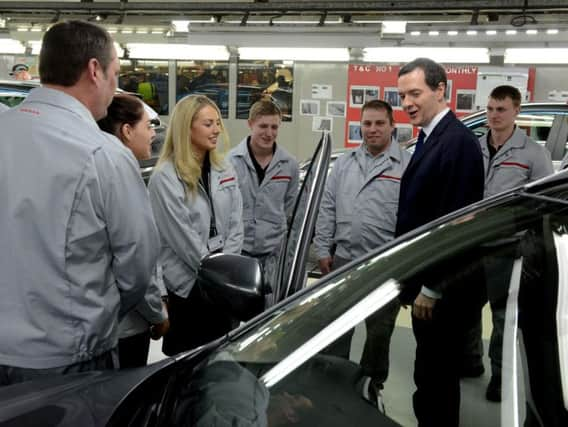Britain must listen to Nissan 'seek closest possible relationship' with Europe, says George Osborne


Amid controversy over Theresa May's apparent readiness to make immigration controls a higher priority than full access to the European single market, Mr Osborne warned that the future success of industries such as car manufacturing will depend on the ability to sell goods and services to the remaining 27 EU states.
Advertisement
Hide AdAdvertisement
Hide AdGiving evidence to the House of Commons Business Committee, Mr Osborne was asked how the Government should respond to Nissan's warning that future investment in the firm's Sunderland car plant will depend on the outcome of talks on the UK's future trading relationship with the EU.
He said: "This Government and this Parliament have got to make the UK the place to make cars in Europe - as it has been in recent years.
We have got to make sure that the future for the automotive industry is very successful, that this is an environment where people want to come and build their cars, where there's access to a skilled workforce, where the tax regime is right and the local economy can support the car plant and they can export those cars into the continent of Europe.
"We are a European base for car manufacturing. We produce more cars out of that plant in Sunderland than the whole of Italy. That's got to be something we focus on in the coming years, and overcome the challenges that present us."
Advertisement
Hide AdAdvertisement
Hide AdFormer president of the Board of Trade Lord Heseltine indicated that he was sceptical of ministers' ability to find new markets for British exports to replace any business lost as a result of withdrawal from the European Union.
Giving evidence alongside Mr Osborne, Lord Heseltine mocked Mrs May's appointment of the "three Brexiteers" - Boris Johnson, David Davis and Liam Fox - to key Cabinet roles. He said: "We have three ministers now in charge - a brilliant set of appointments, in my view, because they can come up with the answers which have escaped me.
"The ability to trade seems to me to be an important part of our future. We have to find places to trade and if there are all these markets that have escaped the attention of British exporters it will be marvellous to have them pointed out to them by the ministers responsible."
Mr Osborne - who was accused of scaremongering ahead of the referendum for his graphic warnings of the economic dangers of Brexit - said the UK faced an "interesting challenge" during withdrawal negotiations to avoid being forced into a "binary" choice between remaining within the European single market and seeking new trade deals elsewhere in the world.
Advertisement
Hide AdAdvertisement
Hide AdThe former chancellor, who was sacked by Mrs May when she created her first Cabinet in July, said: "I agree with what my successor said at the Conservative conference. Philip Hammond said the country didn't vote to make itself poorer. That wasn't the intention of the majority who voted to leave the EU.
"So we want to make sure we continue to have the closest possible economic relationship with the place where over 40% of our exports go.
"That shouldn't be to the exclusion of closer economic ties with other parts of the world. I didn't think that was inconsistent with being a member of the EU but, now we are leaving the EU, we should certainly pursue these avenues, and a good example of that is our relationship with China.
"As the Government approaches this, we should be making sure we retain close economic relations with the place where many British companies export their goods. How that happens, we are going to see over the next two years.
Advertisement
Hide AdAdvertisement
Hide Ad"What you want to do is maximise your export opportunities with all your markets or potential markets. We want to do more trade with Australia, but that shouldn't be at the cost of less trade with Germany. We need to try to find arrangements that allow us to do both.
"It's no good increasing your trade with Australia if your trade with Germany, France, and Belgium suffers dramatically as a result. We can't escape the fact that we are going to be doing a lot of trade with some of our near neighbours, some of the most prosperous advance economies in the world."